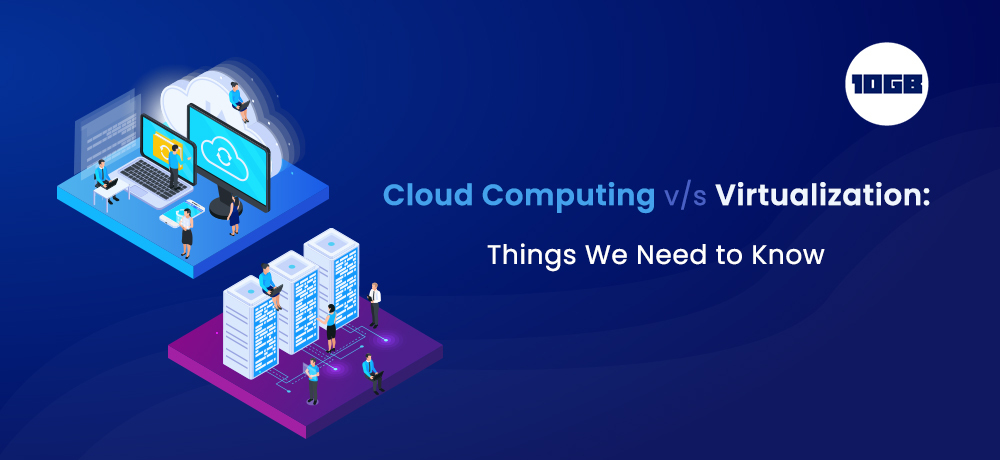Cloud Computing vs Virtualization
In the current era, several businesses have shifted their either a part or all of the operations online. To survive in this competitive web industry, businesses are using one technology better than the other. One such technology that recently created a buzz is cloud computing. Cloud computing is linked to everything in the cloud. Be it the cloud systems, cloud services, web hosting, platforms, etc. Now adding to the fact, several people believe that the cloud is virtual, so cloud computing and virtualization are the same (This statement is partially true).
Through this article on Cloud Computing vs Virtualization, I aim to help in solving the confusion and in detail explain the difference between cloud computing vs virtualization
Let’s first understand what virtualization is
Table of Contents
What is Virtualization?
In simple words, Virtualization is the process of creating a resource in the virtual form instead of physical form. These resources can include an operating system, network, file, storage, etc. Virtualization aims to simplify and efficiently manage the workload to an extent that it makes computing scalable.
In total there are 7 various kinds of virtualization i.e. OS virtualization, Server virtualization, Application virtualization, Hardware virtualization Network virtualization, Administrative virtualization, and storage virtualization.
Here let’s take an example of Server virtualization. In this type of virtualization, a physical server is divided into various servers by using a software called Hypervisor. The servers that are partitioned are in a separate environment so that they neither hinder the computing of other servers nor share the resources. Each such virtual compartment is called a virtual machine or a virtual private server(VPS). Meanwhile, you can also read the benefits of managed VPS hosting.
So having said about server virtualization you must know now that Cloud computing is essentially a product of virtualization but there are differences.
Now lets see what cloud computing is
What is Cloud Computing?
In contrast to virtualization that is a technology, cloud computing basically is a service that supports offering computing services. The computing services incorporate networking, servers, software, database, storage, etc. These services can be availed over the internet on-demand and companies providing such services are called ‘Cloud Providers’.
Mainly there are three different kinds of cloud models namely public, private and hybrid cloud.
Let’s see what these three are:
Public Cloud: In Public Cloud, the server is distributed between various users and is handled by the third-party Cloud Hosting Providers
Private Cloud: In Private Cloud, the complete server is dedicated/allocated to a single organization and the server space is not distributed among anyone.
Hybrid Cloud: The Hybrid Cloud is a mixture of both private and public cloud and gives the best of two.
Besides these cloud models, there are still three services offered across the cloud.
Platform as a Service(PaaS), Infrastructure as a Service(IaaS) and Software as a Service(SaaS). Each of these services is developed on top of each other and help in achieving various business goals. Depending on the business type you can pick which cloud service fits you.
Cloud Computing Vs Virtualization
As we have observed Cloud Vs Virtualization differences. Let’s see which has more advantages. No doubt virtualization has more advantages over Cloud Computing. However, it depends on the business type and its requirements.
For example, in a public cloud, no security is involved as the computing resources are distributed between all the users. The website loading speed could also be affected as the resources are shared. However, with a private cloud, all the issues are resolved and hence will provide flexibility and control in managing the resources.
On the other hand, through virtualization, the users share the same space with other users however the resources wouldn’t be shared. The benefit of this is that you can take a maximum of the server because you can install more than one system on a single same physical hardware. Hence virtualization becomes more pocket friendly as compared to cloud computing.
Having stated this, does it signify that each and every business should utilize Virtualization and not Cloud Computing? No, based on the type of business you have and its demands, the preferences vary.
As a business, if you are searching for a further in-depth and configurable server environment then virtualization is the solution for you. Speaking clearly regarding hosting, if you want to have complete root access to all the resources then Virtual Private Server (VPS) Hosting is the most suitable solution for you.
Or on the contrary, if you are a thriving business and want to outsource the IT resources then picking cloud computing will be best for you. In accordance with hosting if you are seeking easy scalability of your website as and when needed then Cloud Hosting is an effective option.
